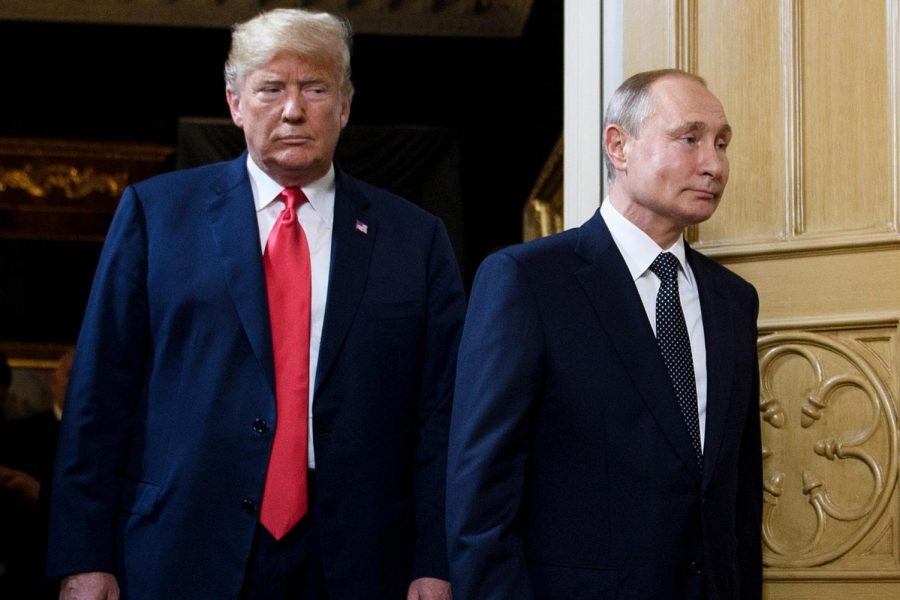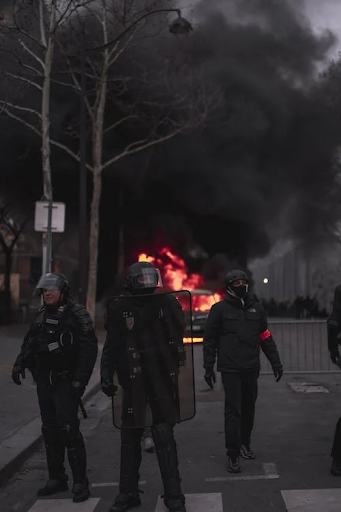A New Cold War
February 24, 2019
Since the end of World War II, the world has kept a close vigil on two powerful nations: the United States and Russia. These two countries, once critical allies in the last world war, were able to put aside their differences to end the conflict. However, a serious fallout between these two nations created a devastating dispute through a show of power.
This “cold war,” through which no bullets were fired and no lives were lost in combat, created a sense of superiority between the Soviet Union and the US for nearly five decades. Numerous nations caught in the middle of the conflict were quick to adjust by losing trust in one another and forming several alliances.
The immense strength and resources of each nation’s military rivaled one another for years, but the only factor preventing a catastrophic war between the nations was a vast arsenal of nuclear warheads.
Now, over 25 years after the end of the Cold War, tensions have been all but high between Russia and the US, and it appears they’re not going to cease.
With new discoveries of spies, showcases of military strength, and a growing list of enemies, is it possible that the United States and Russia are entering another Cold War?
A Show of Arms
Throughout the course of the Cold War and afterward, several conflicts in various regions of the world have been fueled and supported by the United States and Russia. The Vietnam War, Soviet Afghan War, and Yom Kippur War, for instance, are evidence that the Soviet Union and the United States have indirectly gone to war with one another. These two nations used these conflicts to display their strength and advanced technology, and have even supported groups of governments and fighting forces to spread their beliefs and ideologies.
However, in the 21st century, Russia and the United States continue to repeat these actions and fuel other fights. In fact, the civil war in Syria continues on due to both nations providing troops, weaponry, and intelligence to opposing forces.
The Syrian Civil War, a conflict between its government and several rebel groups, was caused when the Syrian people began to protest against its government and president. The government then cracked down on peaceful protesting and prolonged Bashar al-Assad’s rule as president. This sparked an armed rebellion that divided the nation, nearly collapsed its government, and killed hundreds of thousands of people.
While both nations have important reasons for participating, such as Russia with its close alliance with Syria and desired resources in the Middle East, and the United States fighting for autonomy and ending ISIS forces in Syria, both nations are guilty of using the conflict as a show of arms and strength. In fact, just like the previous conflicts they participated in, both nations have been providing military resources the Syrian forces.
And with President Donald Trump announcing that the United States will remove all troops from Syria, it stands to question whether this conflict, like many previous ones, will come to an end. However, it is likely that the United States will still provide resources should the conflict continue.
Espionage
Throughout the 20th century, both Russia and the US have been guilty of espionage. In fact, an essential part of intelligence and communication during the Cold War involved spying on the countries. And although the Cold War ended over two decades ago, there are still spies present in each nation.
In 2017, a Russian woman named Maria Butina was found guilty for “conspiring to act as a foreign agent.” Butina also admitted, as part of her plea, that she tried to create “unofficial lines of communication with Americans having influence over U.S. politics” in order to aid the Russian government. This federal offense could cause Butina to face five years in federal prison. However, after aiding US investigators during her case to reveal more information regarding her actions, Butina’s sentence could be lessened.
However, Russia is not the only one that was recently accused of interfering with another nation. In the past few weeks alone, Paul Whelan, a former US Marine, was arrested in Moscow, Russia on Dec. 28, 2018. After arriving in Russia to allegedly attend a wedding, Russian officials immediately arrested Whelan for accounts of espionage when he received a USB drive from another individual that contained “state secrets.”
Whelan, now being held without bail, is currently awaiting trial and is held in Moscow’s Lefortovo prison. If he is found guilty, he could face up to 20 years in prison.
2016 United States Presidential Election
In November of 2016, Donald Trump was elected president of the United States, and it didn’t take long for the people to begin to question the election. In fact, many rumors arose that Russia had interfered with the presidential election to ensure Trump gained more popularity and support in order to be elected. Although Russian officials have denied these claims, the United States launched an investigation led by Robert Mueller to determine the truth. Mueller, head of the special counsel for the United States, is still currently investigating the allegations.
On July 16, 2018, Russian President Vladimir Putin and Trump met in Finland for the Helsinki Summit to discuss the relationship between Russia and the United States as well as the 2016 presidential election among other matters.
During a joint press conference with both presidents, Trump stated, “I have great confidence in my intelligence people, but I will tell you that President Putin was extremely strong and powerful in his denial today. And what he did is an incredible offer; he offered to have the people working on the case come and work with their investigators.”
Trump not only denounced his own intelligence community, but he also viewed Putin’s offer to be beneficial. While Russia was willing to cooperate with the investigation, it is concerning that they would want the investigators to move to Russia, where they could possibly withhold or prevent information from being reviewed.
A New Era
For many years, the tensions between Russia and the United States were at an all time high. Even after the Cold War ended, the strained relationship between the two nations caused many international problems. As we enter the second decade of the 21st century, a new cold war has emerged. Although there are different players, the world is once again at risk of a global conflict. It is important that the leaders of both nations try to diffuse this tension in order to have lasting peace.











